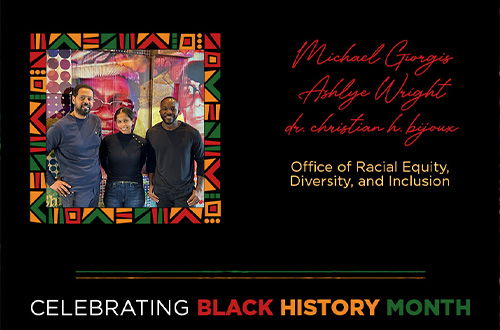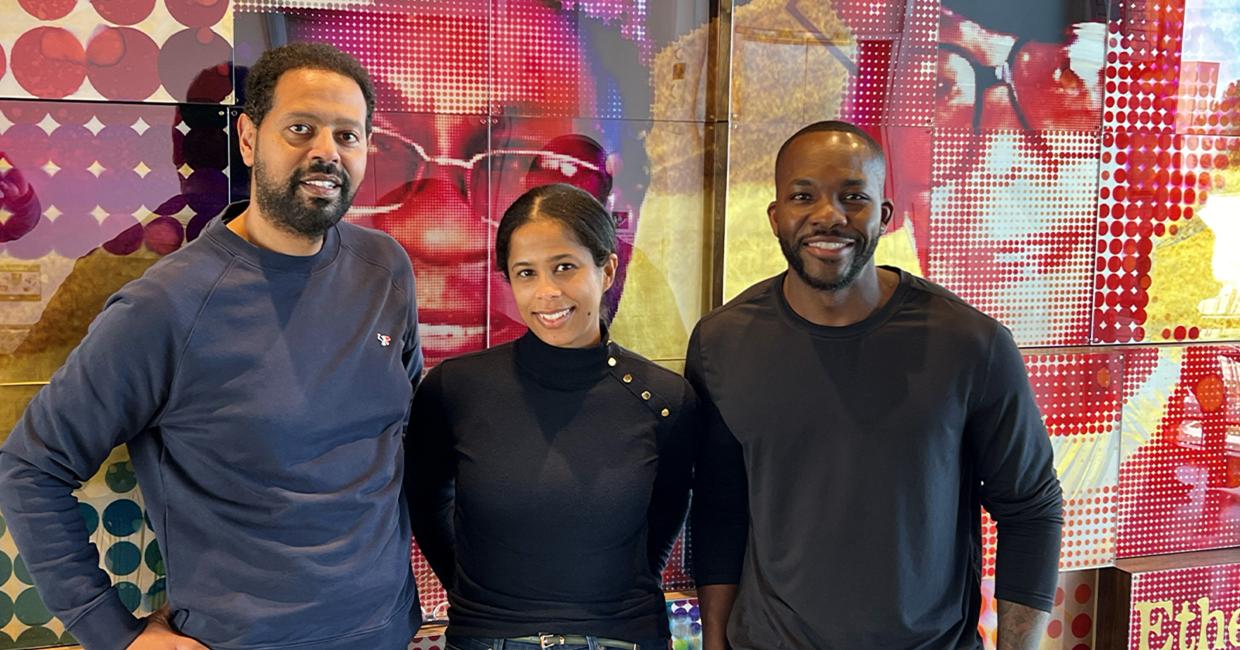Celebrating Black History Month
During the month of February is Black History Month, a time to celebrate the many contributions and accomplishments of the Black community. This month provides an opportunity to acknowledge the impact of Black leaders, reflect on the challenges faced by the community, and celebrate the resilience and achievements that have shaped our collective history.
The San Francisco Public Utilities Commission's (SFPUC) Office of Racial Equity, Diversity, and Inclusion (REDI) team is comprised of dr. christian h. bijoux (Chief Diversity, Equity, & Inclusion Office), Ashlye Wright (Racial Equity Analyst), and Michael Giorgis (Racial Equity Analyst). We had a chance to have a conversation with them as they talked about the importance of celebrating Black History Month.

Question: What does Black History Month mean to you all?
dr. christian h. bijoux (cb): Black History Month holds profound significance for me as it serves as a dedicated time to honor and reflect upon our ancestors' extraordinary contributions, resilience, and sacrifices. It's a reminder of their struggles, the barriers they overcame, and the progress they achieved despite systemic adversity. Black History Month is not just a celebration; it's a commitment to preserving our heritage and acknowledging the indomitable spirit that paved the way for the better lives we lead today.
Ashlye Wright (AW): It is a time to acknowledge, learn, reflect, and share the journeys and central roles of Black people, in the United States and globally, throughout history and present. It’s a reminder for us to reflect on our role in society and identify what imprint we want to leave.
Michael Giorgis (MG): Black History Month is a time for me to reflect on and celebrate the achievement of Black people not just in the United States but throughout the world. Our journey is not all the same, so it is also a time for me to educate myself and understand the direct and indirect racial injustice that we have encountered and continue to face in our society today.
Question: What are you most proud of about your culture?
cb: I am most proud of the resilience and strength embedded in Black culture. Despite facing intentional barriers and enduring systemic injustices, our people, our communities, and our culture remain vibrant and unyielding. I am proud that we continue to persevere, embracing our identity and values in the face of efforts to dehumanize, devalue, and demonize us. Our ability to maintain our authenticity, support our community, and uphold our values speaks volumes about the richness and depth of Black culture.
AW: I admire the inherent ability to find light in the darkest moments.
MG: I am most proud of the many contributions Black culture has made to society in the field of history, politics, science, music, food, art, and fashion to name a few, while continuing to face adversity. I cherish and celebrate the recognition of the achievements by those that came before me.
Question: How can the community work together for a more equitable future?
Group Answer: Achieving a more equitable future requires collective effort. We must educate ourselves and others about the historical context that shaped our society, acknowledging the struggles faced by marginalized and oppressed communities. It's crucial to amplify diverse voices, ensuring representation in decision-making processes. Collaborative initiatives, such as mentorship programs and resource-sharing, can uplift those facing systemic challenges. The community can contribute to a more just and equitable future for all by fostering empathy and understanding and actively dismantling discriminatory structures, both internal and external.
Question: What advice would you give to young students looking to start a career in City Government?
cb: To young students aspiring to enter City Government, I emphasize the importance of being well-versed in their communities' history and current challenges. Understand the power dynamics, be prepared to challenge conventional wisdom and the ways things have always been done, and advocate for inclusive policies. Cultivate a network of mentors and peers who can offer guidance and support. Your perspective is an asset, so be unapologetically true to yourself, your values, and your community. Use your position to amplify underrepresented voices and work tirelessly to create policies that advance equity and justice.
AW: Be willing to explore pathways beyond the traditional career fields that are socialized. There are many exciting and fulfilling roles in the City that take a little digging to uncover. Once you find it, don’t be afraid to put your own mark on it; your unique perspective may spark the journey for someone else.
MG: The City and County of San Francisco has approximately 60 departments and employs more than 30,000 staff. An organization of this size provides a wide variety of employment and learning opportunities while getting the satisfaction of providing service to the community.
Question: Is there anything else that you would like to add?
Group Answer: It is crucial to remember that our journey is intertwined with the sacrifices of those who came before us. Let their struggles inspire us to continue the fight for justice. As we move forward, let us remain true to our values, support our communities, and stand resilient against the forces that seek to maintain the status quo.


